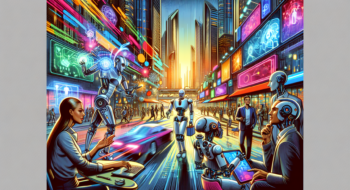In today’s fast-paced job market, the integration of HR technologies and artificial intelligence is revolutionizing the recruitment and hiring processes. Companies are leveraging hiring automation to streamline operations, significantly reducing the time and effort required to find the right talent. One of the most impactful advancements is in resume analysis, where AI algorithms quickly sift through large volumes of applications to identify the best candidates. This transformation not only enhances efficiency but also improves the quality of hires, making the recruitment process smarter and more effective than ever before.
Candidate Sourcing: The AI Advantage
AI has transformed the way recruiters find and connect with potential candidates. AI-based sourcing tools automate the process of searching job boards, social media, and internal databases to identify the most relevant candidates for a particular role. These tools use algorithms and machine learning to provide data-driven insights and recommendations, helping recruiters make informed decisions.
For instance, AI chatbots like L’Oreal’s Mya interact with candidates to determine their fit for a role and guide them through the application process. This not only speeds up the sourcing process but also ensures that recruiters reach a broader pool of candidates, including both active and passive job seekers.
Efficient Candidate Screening
One of the most time-consuming aspects of the recruitment process is screening candidates. AI screening tools have revolutionized this step by quickly extracting crucial information from job applications and evaluating candidates based on their skills, experiences, and behaviors. These tools can process resumes about 70% faster than manual methods, significantly accelerating the hiring process.
AI screening systems go beyond just parsing resumes; they also conduct behavioral and skill evaluations to identify red flags and compatible personality traits. This helps recruiters narrow down the candidate pool to those with the highest potential, ensuring better matches and reducing the risk of poor hires.
Enhancing Candidate Experience
AI-driven tools are not just about efficiency; they also enhance the candidate experience. Chatbots and automated systems provide immediate responses to candidate inquiries, schedule interviews without the back-and-forth, and offer personalized updates on application status. This level of personalization and efficiency is crucial, as 58% of candidates have rejected job offers due to negative experiences during the hiring process.
By streamlining and simplifying the hiring process, AI keeps top talent engaged and informed throughout the recruitment journey. This includes using generative AI to summarize why a candidate would be a good fit for a role, making the process more transparent and engaging.
Reducing Recruitment Bias
Human biases often creep into the recruitment process, influencing decisions in ways that are not aligned with corporate values. AI can counteract these biases by screening candidates objectively based on qualifications and experience, without considering subjective factors like age, gender, and race. This ensures a more diverse and inclusive hiring process.
AI technology allows recruiters to set specific factors for screening, removing any prejudice toward ethnicity, age, and gender. This practice sharpens the talent acquisition function by using data-driven analytics and digital tools to better source and assess candidates, preventing misjudgments caused by bias or false logic.
Improving the Quality of Hires
AI significantly enhances the quality of new hires by optimizing every step of the hiring process. It scrutinizes candidates’ skills and compatibility with the company culture, leading to more fitting matches. This precise matching is crucial, especially considering the high costs associated with poor hires — up to 30% of the employee’s first-year salary.
AI-powered recruitment tools can cut down hiring time by up to 90% and screen resumes 70% faster than manual methods. The adaptive nature of AI means it continually refines its selection process, consistently improving at identifying candidates who meet the company’s current needs and will be valuable long-term assets.
Maximizing Recruitment Efficiency
AI-based sourcing and screening tools significantly reduce the manual labor involved in sifting through applications. This automation enables HR teams to dedicate more time to strategic tasks, boosting productivity and reducing the need for additional staff. According to the LinkedIn Future Of Recruiting 2024 survey, AI makes writing job descriptions faster and easier, allows HR teams to dedicate more time to rewarding work, and eliminates routine daily tasks.
For example, AI can help with day-to-day tasks such as answering candidate benefits queries via chatbot or auto-scheduling interviews, freeing up recruiters to focus on more critical aspects of the hiring process. This reduces bottlenecks and makes the entire hiring process run smoother.
Real-World Benefits and Success Stories
Companies that have adopted AI in their recruitment processes have seen significant benefits. For instance, a company that received over 2,200 applications every week reduced its recruitment costs by 75% and its cost per hire by 71% after implementing AI for CV screening. They also tripled their number of qualified candidates and improved their recruitment efficiency by almost four times.
Another example is a company that uses AI to score and prioritize candidates based on the profiles of their top performers. This approach has resulted in higher-quality candidates and faster time-to-hire rates, with hiring times reduced from 62 days to under 30 days.
Conclusion
The integration of AI in recruitment is not just a trend; it’s a transformative force that is reshaping the hiring landscape. By automating time-consuming tasks, improving candidate matching, and providing data-driven insights, AI is making the recruitment process more efficient, accurate, and effective.
For those looking to leverage AI in their recruitment strategies, it’s essential to consider how and where AI can best support their needs. Whether it’s through AI-powered recruitment tools, chatbots, or generative AI, the key is to balance technology with personal connection to create a seamless and engaging candidate experience.
As the recruitment market continues to evolve, understanding the benefits and challenges of AI will be crucial for recruiters and hiring managers.
By embracing AI and automation, companies can not only streamline their recruitment processes but also attract and retain top talent more effectively. For more insights into how AI can transform your hiring strategies, visit Neyrotex.com.







